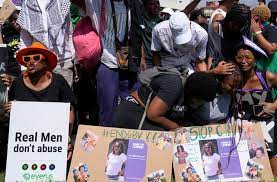
Crisis of African Masculinity Is Endangering Women’s Lives

 :
| Updated On: 21-Jun-2025 @ 12:16 pm
:
| Updated On: 21-Jun-2025 @ 12:16 pmSHARE
The tragic murder of 30-year-old South African woman Olorato Mongale on May 25, 2024, has reignited urgent conversations around gender-based violence and toxic masculinity in Africa. Mongale, a former journalist and a master's student, was found brutally murdered after going on a date with a man she had recently met. Her body, showing signs of trauma and bruising, was discovered by the roadside in Johannesburg. Her death triggered widespread public outrage and mourning, especially after her family revealed she had previously quit journalism due to the emotional impact of reporting on gender-based violence and femicide (GBVF). Ironically, she had feared becoming a victim of the very violence she once reported on.
Mongale’s case mirrors the 2017 murder of Karabo Mokoena, another young South African woman killed by her ex-boyfriend. Despite efforts to avoid the same fate, Mongale became one more name in the ever-growing list of women murdered by men in South Africa. Her mother’s emotional testimony during the funeral emphasized that she had fought hard to survive, serving as a heartbreaking symbol of the broader national crisis.
In response to ongoing violence, South African President Cyril Ramaphosa signed a law on May 24, 2024, creating the National Council on Gender-Based Violence and Femicide. This council is tasked with coordinating anti-GBVF efforts. However, similar initiatives have been tried before, such as the 2012 council launched by former Deputy President Kgalema Motlanthe, with limited success. The continuing rise in GBVF incidents suggests that these efforts have yet to address the root causes effectively.
A 2023 national study by South Africa’s Human Sciences Research Council found that GBVF is deeply embedded in societal norms that reinforce male dominance, systemic inequalities, and the subjugation of women. South Africa sees a woman murdered every three hours—about eight a day—and nearly 7.8 million women have experienced physical or sexual violence. Black women, in particular, face the brunt of this crisis, exacerbated by lingering apartheid-era inequalities.
This epidemic is not confined to South Africa. Across the continent, the situation is equally dire. The United Nations reported that Africa had the highest global rate of partner-related femicide in 2023. In Kenya alone, between September 2023 and December 2024, over 7,100 cases of sexual and gender-based violence were recorded, including at least 100 femicides. Among the victims was Ugandan Olympian Rebecca Cheptegei, who was set on fire by her ex-partner during a domestic dispute.
Kenyan authorities have acknowledged GBVF as the country’s most urgent security challenge. Experts blame a complex mix of cultural, economic, and legal factors, including harmful traditions like forced marriage, FGM, dowry violence, and financial dependence. COVID-19 lockdowns exposed the full scale of the crisis, yet awareness campaigns since have had limited success. Afrobarometer data reveals that nearly half of Africans still view domestic violence as a private matter.
Ultimately, the solution lies in cultural transformation. African men must reject harmful ideals of masculinity and actively protect women. Change must begin at home and extend through schools, religious institutions, and communities. Without this, a just African future remains out of reach.
Contact Us
House. No. : 163, Second Floor Haridev Rd, near Puberun Path, Hatigaon,Guwahati, Assam 781038.
E-mail : assaminkcontact@gmail.com
Contact : +91 8811887662
Enquiry
×
Reporter Login
×